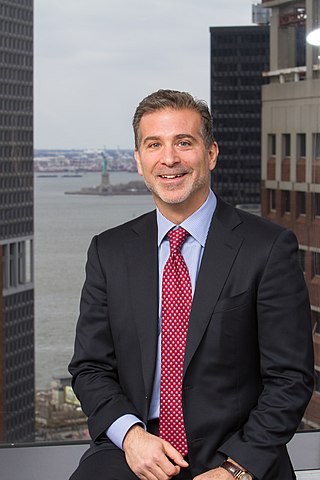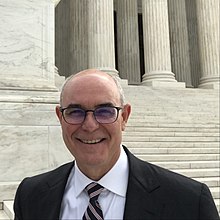
The False Claims Act of 1863 (FCA) is an American federal law that imposes liability on persons and companies who defraud governmental programs. It is the federal government's primary litigation tool in combating fraud against the government. The law includes a qui tam provision that allows people who are not affiliated with the government, called "relators" under the law, to file actions on behalf of the government. This is informally called "whistleblowing", especially when the relator is employed by the organization accused in the suit. Persons filing actions under the Act stand to receive a portion of any recovered damages.

Jones Day is an American multinational law firm based in Washington, D.C. As of 2023, it is one of the largest law firms in the United States with 2,302 attorneys, and among the highest grossing in the world with revenues of $2.5 billion. Originally headquartered in Cleveland, Ohio, Jones Day ranks first in both M&A league tables and the 2017 U.S. Law Firm Brand Index. The firm has represented over half of the companies in the Fortune 500, including Goldman Sachs, General Motors, McDonald's, and Bridgestone. Jones Day has also represented former President Donald Trump.
Milberg Coleman Bryson Phillips Grossman, PLLC is a US plaintiffs' law firm, established in 1965 and based in New York City. It has mounted many class action cases on behalf of investors.
Theodore H. Frank is an American lawyer, activist, and legal writer based in Washington, D.C. He is the counsel of record and petitioner in Frank v. Gaos, the first Supreme Court case to deal with the issue of cy pres in class action settlements; he is one of the few Supreme Court attorneys ever to argue his own case. He wrote the vetting report of vice-presidential candidate Sarah Palin for the John McCain campaign in the 2008 presidential election. He founded the Center for Class Action Fairness (CCAF) in 2009; it temporarily merged with the Competitive Enterprise Institute in 2015, but as of 2019 CCAF is now part of the new Hamilton Lincoln Law Institute, a free-market nonprofit public-interest law firm founded by Frank and his CCAF colleague Melissa Holyoak.

William Mark Lanier is an American trial lawyer and founder and CEO of the Lanier Law Firm. He has led a number of high-profile product litigation suits resulting in billions of dollars in damages, including Johnson & Johnson baby powder and Merck & Co.'s Vioxx drug.
Riddell Sports Group is an American company specializing in sports equipment for American football. It was headquartered in Rosemont, Illinois. In 2017, the company relocated to a new facility in adjacent Des Plaines, Illinois.
James Bopp Jr. is an American conservative lawyer. He is most known for his work associated with election laws, anti-abortion model legislation, and campaign finance.
Molko v. Holy Spirit Association for the Unification of World Christianity was a legal case heard before the California Supreme Court, which issued its ruling in 1988.
Buckman Co. v. Plaintiffs Legal Comm., 531 U.S. 341 (2001), was a United States Supreme Court case decided in 2001. The case concerned whether the FDCA, a federal statute, pre-empted a state-law fraud-on-the-FDA claim. Although finding it on different grounds, the Court decided to reject the lawsuit attempt.
Bowman v. Monsanto Co., 569 U.S. 278 (2013), was a United States Supreme Court patent decision in which the Court unanimously affirmed the decision of the Federal Circuit that the patent exhaustion doctrine does not permit a farmer to plant and grow saved, patented seeds without the patent owner's permission. The case arose after Vernon Hugh Bowman, an Indiana farmer, bought transgenic soybean crop seeds from a local grain elevator for his second crop of the season. Monsanto originally sold the seed from which these soybeans were grown to farmers under a limited use license that prohibited the farmer-buyer from using the seeds for more than a single season or from saving any seed produced from the crop for replanting. The farmers sold their soybean crops to the local grain elevator, from which Bowman then bought them. After Bowman replanted the crop seeds for his second harvest, Monsanto filed a lawsuit claiming that he infringed on their patents by replanting soybeans without a license. In response, Bowman argued that Monsanto's claims were barred under the doctrine of patent exhaustion, because all future generations of soybeans were embodied in the first generation that was originally sold.

Robert "Bob" J. Giuffra Jr. is an American attorney. He is Co-Chair and a partner of Sullivan & Cromwell in New York, and is a member of their Management Committee.
Monsanto was involved in several high-profile lawsuits, as both plaintiff and defendant. It had been defendant in a number of lawsuits over health and environmental issues related to its products. Monsanto also made frequent use of the courts to defend its patents, particularly in the area of agricultural biotechnology. Bayer acquired Monsanto in 2018, and the company has since been involved in litigation related to ex-Monsanto products such as glyphosate, PCBs and dicamba. In 2020 it paid over $10 billion to settle lawsuits involving the glyphosate based herbicide Roundup.
Kellogg, Hansen, Todd, Figel & Frederick, PLLC is an American law firm based in Washington, DC. It was founded in 1993 by three former Harvard Law School classmates (’82), Michael K. Kellogg, Peter W. Huber, and Mark C. Hansen.

Christopher A. Seeger is an American lawyer who specializes in multidistrict mass tort and class action litigation. He received the most multidistrict litigation (MDL) appointments of any lawyer between 2016 and 2019 according to an 2020 ALM study. Seeger is a founding partner of the firm Seeger Weiss LLP.

Deepak Gupta is an American attorney known for representing consumers, workers, and a broad range of clients in U.S. Supreme Court and appellate cases and constitutional, class action, and complex litigation. Gupta is the founding principal of the law firm Gupta Wessler LLP and a lecturer at Harvard Law School, where he is an instructor in the Harvard Supreme Court Litigation Clinic.
Reid Collins & Tsai LLP is a national trial law firm with offices in New York, Austin, Dallas, Wilmington, and Washington, D.C. The firm represents plaintiffs in complex commercial litigation on a mixed-fee or contingency-fee basis.
Our Children's Trust is an American nonprofit public interest law firm based in Oregon that has filed several lawsuits on behalf of youth plaintiffs against state and federal governments, arguing that they are infringing on the youths' rights to a safe climate system.
Babb v. Wilkie, 589 U.S. ___ (2020), is a case of the United States Supreme Court in which the justices considered the scope of protections for federal employees in the Age Discrimination in Employment Act of 1967. Specifically, the Court ruled that plaintiffs only need to prove that age was a motivating factor in the decision in order to sue. However, establishing but for causation is still necessary in determining the appropriate remedy. If a plaintiff can establish that the age was the determining factor in the employment outcome, they may be entitled to compensatory damages or other relief relating to the result of the employment decision.
Lieff Cabraser is an American plaintiffs' law firm headquartered in San Francisco. The firm was founded in 1972 by Robert L. Lieff. Elizabeth Cabraser became a partner in 1981.
Thompson v. Clark, 596 U.S. ___ (2022), was a United States Supreme Court case concerning whether a plaintiff suing for malicious prosecution must show that they were affirmatively exonerated of committing the alleged crime. The Supreme Court, in a 6–3 opinion authored by Justice Brett Kavanaugh held that no such requirement existed and that a plaintiff suing for malicious prosecution in the context of a Fourth Amendment "need only show that his prosecution ended without a conviction." Justice Samuel Alito dissented from the majority opinion and was joined by Justices Thomas and Gorsuch. Media coverage of the decision portrayed the Court's ruling as a victory for civil rights lawsuits.






